During a Historic Time, Drexel’s Virtual Convocation Looks Ahead
 By Alissa Falcone
By Alissa Falcone
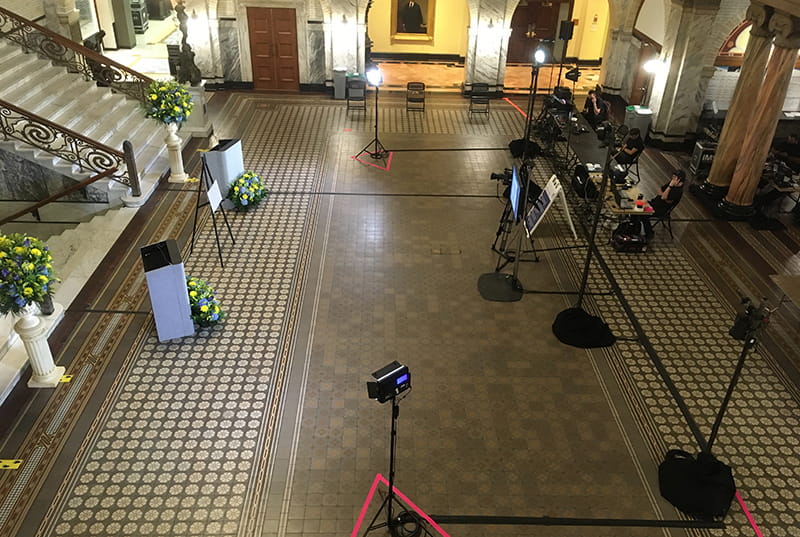
Please visit the ‘Drexel’s Response to Coronavirus’ website for the latest public health advisories.
“What should a university student’s experience look like in a post-pandemic world? How can we ensure that all individuals are seen for their skills and talents, not judged through the lens of preconceived notions or bias? And what does it mean to serve our community?” Drexel University President John Fry asked at this year’s Convocation ceremony (his full remarks can be read here).
The rest of Convocation, which included remarks from University leaders and student and faculty representatives, showed how and why Drexel will be working together to answer those questions this year.
The annual event, which took place on Sept. 30, looked and sounded a little different than the ceremonies of years past. With Drexel starting the school year with undergraduate courses being offered virtually due to the COVID-19 pandemic, most faculty, professional staff and students watched from home instead of gathering on campus. And the speakers spoke of 2020-specific challenges, realizations and questions about educational, working and living environments. But then again, 2020 has been, and likely will continue to be, a year unlike any other.
“We’re starting this new academic year at a moment that’s historic on so many levels: in the midst of a global pandemic, responding to a long-overdue call for racial justice, engaged in a divisive political season and witnessing climate disasters of epic proportions in the West Coast wildfires and Gulf Coast hurricanes,” Fry said.
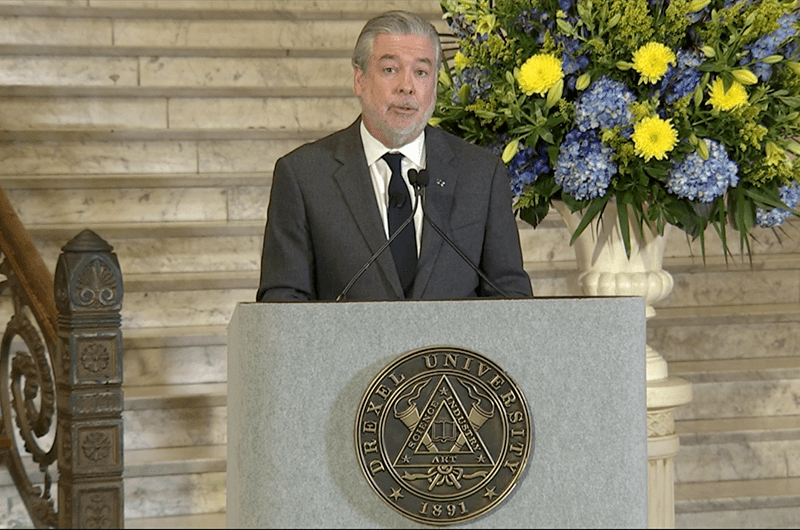
Executive Vice President and Nina Henderson Provost Paul Jensen, PhD, also recognized this during the ceremony by saying, “To all of you — our students, faculty and professional staff — who have forged on through the challenges of these months, I hope you will take this moment to reflect and feel pride in your resilience and all that you have accomplished. The change our world is calling for could not be achieved without you.”
Senior Vice President for Graduate and Online Education and Dean of the Graduate College Elisabeth J. Van Bockstaele, PhD, and Undergraduate Student Government Association Student Body President Tim Hanlon, a fourth-year honors biology student in the College of Arts and Sciences, spoke to the student experiences of the new academic year. Graduate students, as Van Bockstaele noted, joined research-intensive faculty to be among the first to return to campus this year, “fueled by their dedication to identifying solutions to the world’s biggest problems through innovative research and critical thinking.” And undergraduate students will be represented by Hanlon and his student government in conversations with the Drexel administration, as recently evidenced by the University’s recent decision to close early on Election Day, Nov. 3, to allow for Dragons to vote.
This year, Convocation served as a touchstone to “rededicate ourselves to Drexel’s essential mission of inspired teaching and experiential learning, to research that improves lives, and to the many ways of serving our community,” Fry said.
He outlined the ways in which the Drexel community will be working together to improve three important three areas: learning, inclusiveness and service.
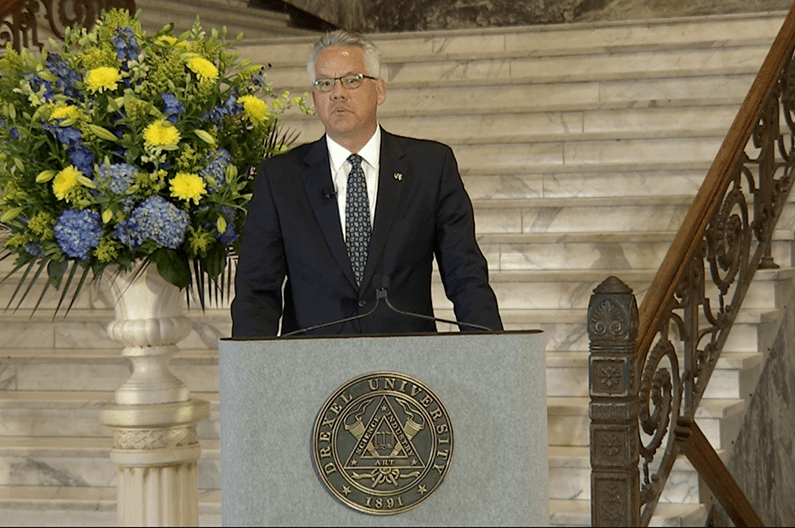
Learning and inclusiveness, Fry said, means recognizing and building a more diverse, inclusive, welcoming and equitable culture at the University. Vice President and Chief Diversity Officer Kim Gholston expanded on this idea at Convocation and detailed the tangible ways Drexel is actively working to achieve it.
Gholston outlined the accomplishments and work of Drexel’s Anti-Racism Task Force, which she co-chairs with School of Education Associate Dean for Academic Affairs and Graduate Studies Aroutis Foster, PhD; Senior Vice President for Student Success Subir Sahu, PhD; and Senior Vice Provost for University and Community Partnerships Lucy Kerman, PhD. The Task Force is composed of more than 100 students, faculty, professional staff and alumni, and since its creation this summer the members have organized a University-wide forum and has listened to and gathered questions, comments, concerns and criticisms from Dragons.
“Acknowledging pain, disappointment and hurt in your education and work environment can be very difficult. It’s also difficult admitting what you don’t know, what you haven’t thought about or considered, and what you may have overlooked because it wasn’t an issue in your world. As difficult and emotional as the revelations and conversations have been for us, they have also served as agents for change for Drexel, and for that, I thank you, and I know future Dragons will also thank you,” said Gholston.
Going forward, the Task Force will be submitting, discussing, analyzing and refining recommendations from its 11 committees, with final recommendations due by the end of the year. Later this term, Drexel’s Center for Black Culture will open on the first floor of the Rush Building, and will act as “a place where we can share knowledge of the people, histories, and culture of the African diaspora and to celebrate their extraordinary contributions to the world,” according to Gholston.
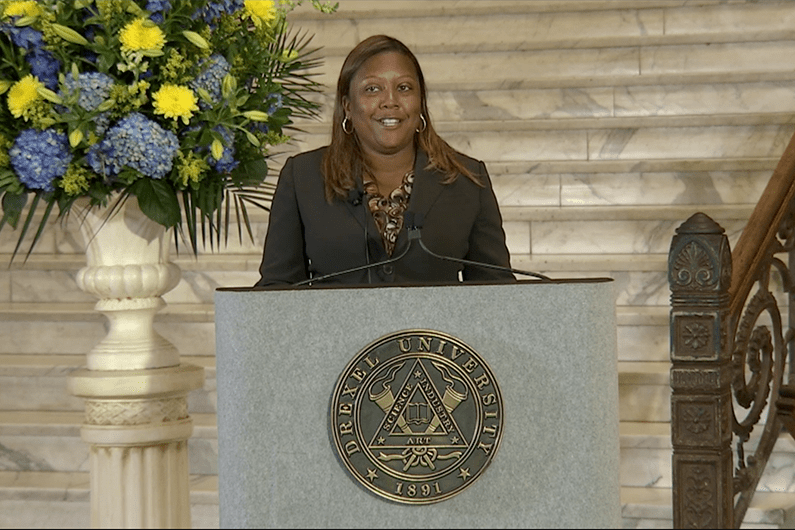
Service, the third area Fry said Drexel will be actively engaging in this year, is a multipronged approach including participating in the upcoming 2020 election and amplifying the way civic engagement is weaved throughout Drexel’s teaching and learning experiences.
“Our obligations to our community, to our surrounding neighborhoods and the people who live there, are more important than ever. We must continue to build bridges to our neighbors in the surrounding community, who often are also facing challenges, challenges that we don’t necessarily see. We must be an ally through this pandemic, racial injustice and weight of trauma that presses on us from this,” said College of Medicine Associate Dean of Community and External Affairs Ted Corbin, MD, who is also the co-director of Drexel’s Center for Nonviolence and Social Justice and spoke at Convocation representing the faculty.
Corbin spoke to the intersection of health, trauma and social justice and how Dragons can live as good neighbors. Living through the uncertainty of the COVID-19 pandemic and witnessing the hard truths of systemic racial injustice, he said, can be an opportunity to practice self-care, rethink how we will “be” in the world and check in on our friends and family to hold each other up.
For Fry, this year’s Convocation, and its emphasis on service and civic engagement, was marked by personal historic significance as well. In his first year as Drexel’s president in 2010, Fry announced his vision at that year’s Convocation to make Drexel the most civically engaged university in the country, as a way of expanding and carrying on the ideals of the University’s founder, financier and philanthropist Anthony J. Drexel. The founder opened the then-Drexel Institute of Art, Science and Industry in 1891 as a place of education that would be “open to all and uniquely suited to the needs of a rapidly growing and changing society,” as Fry said this year.
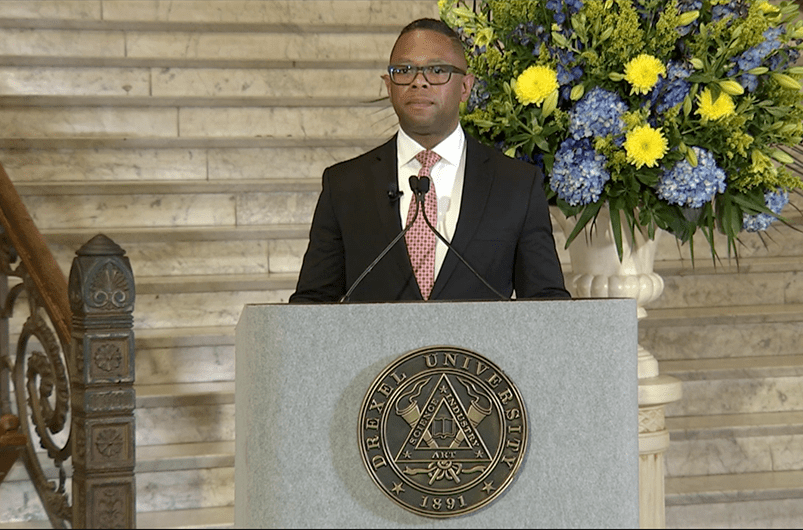
“At my very first Drexel Convocation 10 years ago, I posed one question in particular. And I ask it again today: ‘If Anthony J. Drexel were to walk today through our campus and into the surrounding neighborhoods, would he be satisfied that we are fulfilling our mission as an urban university?’ I also asked then, ‘What are the moral and practical obligations of an urban university like Drexel to serve its community?’ And ‘Is Drexel University a good neighbor?’ A decade later, those questions have taken on even greater urgency,” Fry said.
In looking to the past, Fry noted that Drexel has been shaped during its 129-year history by its civic duty to help move the country forward. The notable Drexel Co-op program, in which students gain professional experience in the workplaces of their chosen fields, celebrated its 100th anniversary last year, and was created to prepare students to enter the workforce and support an American economy devastated by the back-to-back trauma of World War I and the deadly flu pandemic of 1918. That formative moment set the standard for Drexel to act and work to improve society, he said. How Drexel responds now, more than 100 years later and during a different global pandemic and different forces changing America’s status quo, will be determined this year.
“This is truly a moment that calls on all of us at Drexel to innovate, to support one another, and to strive to be the best version of ourselves as individuals and as a community,” Fry said.